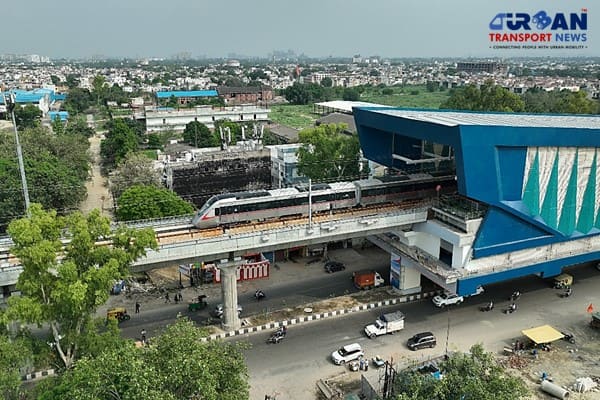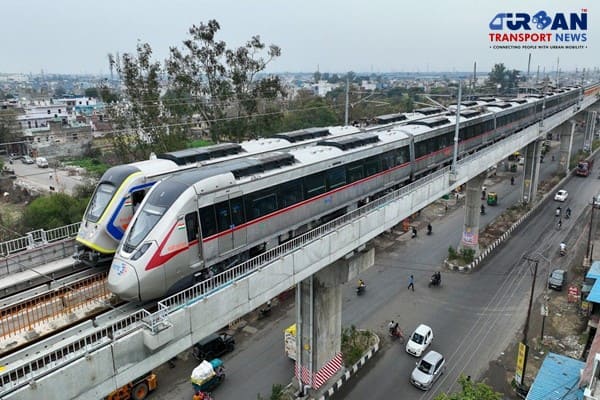 North-South Commuter Railway (NSCR): Modern Train Network Connecting Luzon Island
North-South Commuter Railway (NSCR): Modern Train Network Connecting Luzon Island India launched Bharat Taxi Service as First Cooperative-Owned Digital Mobility Platform
India launched Bharat Taxi Service as First Cooperative-Owned Digital Mobility Platform India places World’s First Live Commercial Order for Hyperloop-Based Cargo Logistics
India places World’s First Live Commercial Order for Hyperloop-Based Cargo Logistics How Weigh-in-Motion Systems Are Revolutionizing Freight Safety
How Weigh-in-Motion Systems Are Revolutionizing Freight Safety Women Powering India’s Electric Mobility Revolution
Women Powering India’s Electric Mobility Revolution Rail Chamber Launched to Strengthen India’s Global Railway Leadership
Rail Chamber Launched to Strengthen India’s Global Railway Leadership Wage and Hour Enforcement Under the Massachusetts Wage Act and Connecticut Labor Standards
Wage and Hour Enforcement Under the Massachusetts Wage Act and Connecticut Labor Standards MRT‑7: Manila’s Northern Metro Lifeline on the Horizon
MRT‑7: Manila’s Northern Metro Lifeline on the Horizon Delhi unveils ambitious Urban Mobility Vision: Luxury Metro Coaches, New Tunnels and Pod Taxi
Delhi unveils ambitious Urban Mobility Vision: Luxury Metro Coaches, New Tunnels and Pod Taxi Qatar approves Saudi Rail Link Agreement, Accelerating Gulf Railway Vision 2030
Qatar approves Saudi Rail Link Agreement, Accelerating Gulf Railway Vision 2030
Prime Minister Narendra Modi inaugurates major Metro and RRTS expansions across India

In a groundbreaking virtual ceremony held at Esplanade Metro Station in Kolkata, Prime Minister Narendra Modi inaugurated significant expansions to the metro networks in Agra, Kochi, Kolkata, Pune, and the Delhi–Merut RRTS. These extensive projects, totaling 40.23 km, encompass five line extensions and introduce two new lines, marking a significant stride in India's urban transportation landscape.
Agra Metro's Priority Corridor
Agra Metro, the newest addition to India's metro systems, saw its 5.2 km Taj East Gate – Mankameshwar (Jama Masjid) section inaugurated. Termed the Priority Corridor, this development positions Agra as the proud host of the country's 17th operational metro system.
Kochi Metro's Phase 1B
Kochi Metro's 1.163 km SN Junction – Tripunithura section, known as Phase 1B, was inaugurated, marking a pivotal moment as Kochi Metro now boasts zero kilometers under construction for the first time since its inception in 2013. Anticipation surrounds Phase 2, set to commence construction later this year.
Kolkata Metro Expands its Reach
In Kolkata, the Green Line's 3.9 km Howrah Maidan – Esplanade section and the Purple Line's 1.25 km Taratala – Majerhat section were inaugurated. Furthermore, the Orange Line's 5.68 km Kavi Subhash – Hemanta Mukhopadhyay section became operational, making it Kolkata's fourth metro line.
Pune Metro Reaches New Milestones
Pune Metro Aqua Line achieved a significant milestone with the 5.94 km Ruby Hall Clinic – Ramwadi section, also known as Reach-3, becoming operational. The foundation stone for the Phase 1A extension from Pimpri Chinchwad (PCMC) to Nigdi was laid, promising further connectivity for the city.
Delhi – Meerut RRTS Progress
The Delhi–Meerut RRTS (Namo Bharat) witnessed the completion of a safety inspection on the 17.1 km Duhai – Modinagar North section. The Commissioner of Metro Railway Safety (CMRS) assessed the viaduct, standard gauge tracks, and passenger amenities, marking a crucial step forward for this 82.15 km project. This section was also inaugurated today by the Prime Minister. With this, the total operational network of the Delhi-Meerut RRTS Project reaches 34.1 kilometers in Uttar Pradesh.
The CMRS's final safety inspection of the Delhi – Meerut RRTS project's Duhai – Modinagar North section is a testament to the project's commitment to safety. Larsen & Toubro's (L&T) successful completion of Package 3's Lot-1 showcases their prowess in delivering crucial metro infrastructure.
The inspection covered three new stations at Muradnagar, Modinagar South, and Modinagar North. The Delhi – Meerut RRTS project has now reached a crucial juncture, with the Duhai – Modinagar North section following the earlier inauguration of the 17 km Priority Corridor between Sahibabad – Ghaziabad – Guldhar – Duhai.
Train and systems testing on the Duhai – Modinagar South section, extended to Meerut South Station, sets the stage for the project's future phases. While Meerut South Station awaits completion, its exclusion from the inspection ensures a thorough assessment once finished.
The CMRS team diligently inspected the viaduct, standard gauge tracks, and passenger amenities, underlining the comprehensive evaluation of the project's safety and operational aspects.
Some Interesting Facts
- Agra Metro's inauguration makes it the 17th operational metro system in India.
- Kolkata Metro's Line-6 (Orange Line) becomes the city's fourth operational metro line.
- Kolkata Metro's Line-2 boasts operational twin tunnels, 15 meters under the Hooghly River, constructed by Afcons – Transtonnelstroy JV in 2017.
- Kochi Metro achieves zero kilometers under construction, a first since 2013, with Phase 2 set to commence construction later this year.
- Pune Metro's Aqua Line, spanning 14.665 km, is fully operational, except for the Purple Line's 3.3 km underground route from Civil Court Station to Swargate Station, where trial runs started in February 2024.
The inauguration of these metro expansions signifies a substantial leap in India's urban transport infrastructure. The seamless integration of new lines and extensions reflects the nation's commitment to enhancing connectivity and promoting sustainable modes of transportation. As these metro networks continue to evolve, they promise to reshape the urban commuting experience for millions, fostering growth and development across the regions they serve.






